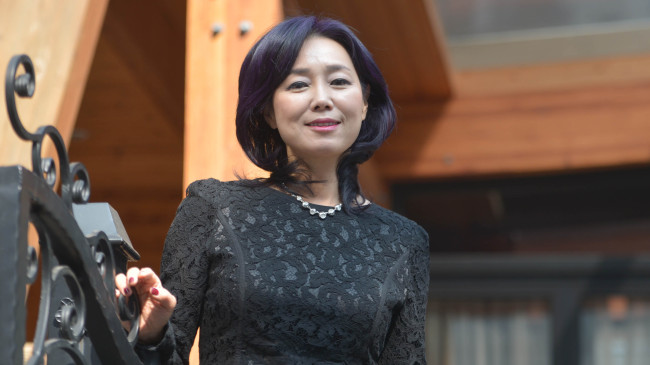Sol’Opera, an opera company that started in Busan eight years ago, is set to stage a series of large-scale outdoor productions next year.
“We’re planning an outdoor opera festival in Busan jointly with Italy’s Arena di Verona,” Lee So-young, founder and president of the company, said in an interview with The Korea Herald.
“It’s going to be a festival with three or so programs on offer ― a gala and two operas, probably.”
 |
Lee So-young, president of Sol’Opera, poses at a cafe in Seoul. (Kim Myung-sub/The Korea Herald) |
It has signed a co-production agreement with the Arena di Verona, the world’s largest outdoor opera house that holds an opera festival every summer. The theater is an ancient Roman amphitheater capable of accommodating 30,000 spectators.
All shows will be produced by the Italian theater and Sol’Opera and then likely staged in Busan either in June or October, the two months when weather is normally sunny and brisk.
“I will fly to Italy in April to sort out the details,” Lee added.
For Sol’Opera ― or for any opera company in Korea ― an outdoor festival is one heck of a project to pull off.
It is costly to stage an opera, as it requires an orchestra, chorus and lots of props and costumes, not to mention the conductor and singers. And because of the physical strain an opera puts on its performers ― unlike musical actors, opera singers don’t use microphones ― it is difficult to run an opera for long enough to turn a profit.
One instance showing how an opera could be derailed by unforeseen factors: a well-known outdoor production of “Turandot” was canceled abruptly in 2010, because of low ticket sales.
But Lee appeared unfazed by the risks.
Bringing in high-profile operas from overseas, Italy in particular, is one area where her team has demonstrated its forte, she said.
Over the past few years, Sol’Opera has successfully staged major productions by Italian companies ― “Carmen,” “Turandot,” “La Boheme,” “Madamme Butterfly,” and mostly recently, “Nabucco” in November last year.
This April, it will stage Donizetti’s comic opera “The Elixir of Love,” together with the Rome Opera House, at Seoul Arts Center. In August, another joint production with Rome Opera ― Puccini’s “Tosca” ― will be presented at Sejong Center for the Performing Arts.
The upcoming production of “The Elixir of Love” offers strikingly visual contrasts ― a minimalist and modern stage design and colorful lights ― on top of solid vocalism and acting, Lee explained.
Sol’Opera has an Italian staff member, too, who doubles as a music director at an Italian opera house.
Lee earned diplomas in classical singing and piano at the Conservatory of Verona. Such links provide the company with an upper hand when it comes to bringing productions from the country.
“Importing productions from Italy is not my final goal. We’re in a learning process. Once we master opera-producing skills up to international standards, we’ll bring our own productions to the world,” she said.
Lee believes that a well-made opera can be a saleable cultural product, just like K-pop and K-dramas, which currently enjoy wild popularity around Asia and elsewhere. Korea has a good chance, given the burgeoning number of its singers performing in renowned opera houses overseas, she added.
Sol’Opera has moved its base to Seoul. Its 2008 production of “Aida” won the golden prize in the annual Korea Opera Award. The following year, its “Turandot” production won the best Korea-foreign joint production award.
By Lee Sun-young (
milaya@heraldcorp.com)








